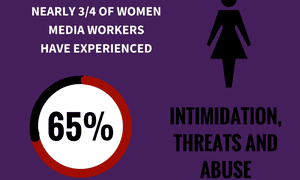
The End Violence Against Women Coalition (EVAW) has revealed the winners of its inaugural awards.
The announcement of its “Ending Violence against Women and Girls Media Awards” has been timed to coincide with the International Day for the Elimination of Violence Against Women.
The awards seek to recognise and celebrate exemplary reporting about the issue across every publishing platform. Winners were chosen for highlighting how and why abuse happens, for showing respect for victims and survivors, and for making an impact on public debate.
More than 150 entries were considered across seven categories. Chair of the judging panel, Joan Smith, said the awards “demonstrate the breadth of contemporary journalism in this field.”
The winners by category were:
Opinion: Lola Okolosie, in the Guardian, for an article revealing the systemic problem of sexual harassment in UK schools.
Broadcast: BBC Radio 4’s Woman’s Hour for exploring the storyline in The Archers concerning coercive control and domestic violence.
Features: Salma Haidrani, writing on The Debrief site about so-called ‘honour-based’ killings in the UK.
News: Radhika Sanghani, in the Daily Telegraph, for examining the impact of current UK abortion law on women seeking abortions.
New journalist: Samara Linton , who wrote for Black Ballad about women detained in Yarl’s Wood detention centre, and about three black women’s experiences of mental health. Described by judges as a “versatile and gifted writer.”
Documentary: ITV’s Exposure (Simon Egan and Esella Hawkey) for Abused and betrayed – a life sentence, which revealed the child sexual abuse committed by Clement Freud.
Wooden Spoon: This was awarded to the Daily Mail for a full-page article headlined “The real revenge porn scandal: Why on earth do so many young women send intimate photos to their partners?”
It argued that the “only fail-safe way to avoid these pictures getting out is not to pose for them in the first place.”
The judges lamented the “staggering hypocrisy” of an article telling women not to pose for nude photos and videos when the Mail’s online outlet trades in semi-nude images of women, many of which are taken without the women’s knowledge or consent.
Joan Smith said: “Sadly, there is still a tendency in some quarters to recycle myths about rape and domestic violence, including ideas about how victims ‘should’ behave.”
On a __more positive note, she said: “There is some first-class journalism out there and it has the power to expose under-reported forms of abuse such as trafficking and so-called ‘honour’-based violence.
“I am delighted that these awards have been created to recognise journalists and editors who, despite the prejudice that still exists towards victims, report on violence against women in a sensitive, constructive and informative way.”
Journalists back call for action against gender-based violence
*The International Federation of Journalists (IFJ) is marking the UN’s Day for the Elimination of Violence Against Women by demanding action over the increasing number of attacks on women journalists.
From Kathmandu to Buenos Aires, it says, journalists’ unions are taking part in meetings, protests, training sessions and marches to highlight the problem.
The IFJ cites a recent study by the International News Safety Institute which shows that almost 65% of women media workers have experienced intimidation, threats or abuse in relation to their work. Nearly a quarter have experienced acts of physical violence at work.
IFJ president, Philippe Leruth, said: “Violence against women remains one of the most widespread and tolerated violations of human rights and its perpetrators continue to enjoy impunity while its victims face losing their job, having their careers ruined, being silenced or worst of all killed.”
He said the IFJ will back affiliates “who seek to take legal action against perpetrators, and support those who seek to negotiate safety and security policies and campaign for the rights of women media workers to be respected.”